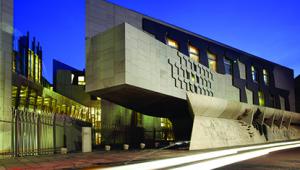By David Scott
30 March 2011
Leaders of Scotland’s main political parties went head to head in a televised debate last night, marking the start of the campaign for the Holyrood elections on May 5.
Tuition fees, the economy and the council tax freeze dominated the live discussion, held before an audience of voters in Glasgow. The debate began with the results of a Scottish Television opinion poll that show Labour and the Scottish National Party neck and neck in the race for control of the Scottish Parliament.
Labour was just one point ahead in the first-past-the post constituency vote at 38%, while the SNP – the minority government for the past four years – was on 37%. In the regional list vote, Labour and the SNP tied with 35%.
In the two votes, the Tories trailed with 15% and 14% respectively and the Liberal Democrats with 7% and 8%.
A later opinion poll, carried out by YouGov and published in the Scotsman this week, showed the LibDems falling to fifth place behind the Green Party in the regions, at 5% and 6% respectively.
First Minister Alex Salmond said SNP policies had contributed towards making Scotland a fairer society. He cited free prescriptions, the four-year council tax freeze and no tuition fees for students.
But Scottish Labour leader Iain Gray argued that Scotland had been disadvantaged by higher than average unemployment.
He confirmed Labour’s U-turn on the council tax freeze, saying his party would continue the ‘no increase’ policy, having previously argued that it was unsustainable.
Salmond told the audience: ‘He [Iain Gray] voted against the freeze every single year and now expects people to believe he is going to freeze it despite arguing against it before Christmas.’
Scottish Conservative leader Annabel Goldie pledged that the
Tories would reduce council tax bills by £200 for pensioner households.
Meantime, the LibDems would exempt pensioners on the lowest incomes from council tax, according to a party announcement on March 30. It said their proposals would mean pensioners with incomes of less than £10,000 would not have to pay any council tax.
Tavish Scott, leader of the Scottish Liberal Democrats, said he hoped it would be possible to take forward plans for a local income tax to replace council tax. He believed it would make local councils more accountable for the money they spend.
Three out of the four leaders – SNP, Labour and the Liberal Democrats – agreed that tuition fees should not be charged for students in Scotland and that the government should be responsible for meeting the resulting funding shortfall.
But Goldie warned that the funding gap could amount to more than £200m – double the government’s calculation, according to university estimates. She warned: ‘I’m not prepared to see voters duped into believing something can be delivered when it can’t.’




















